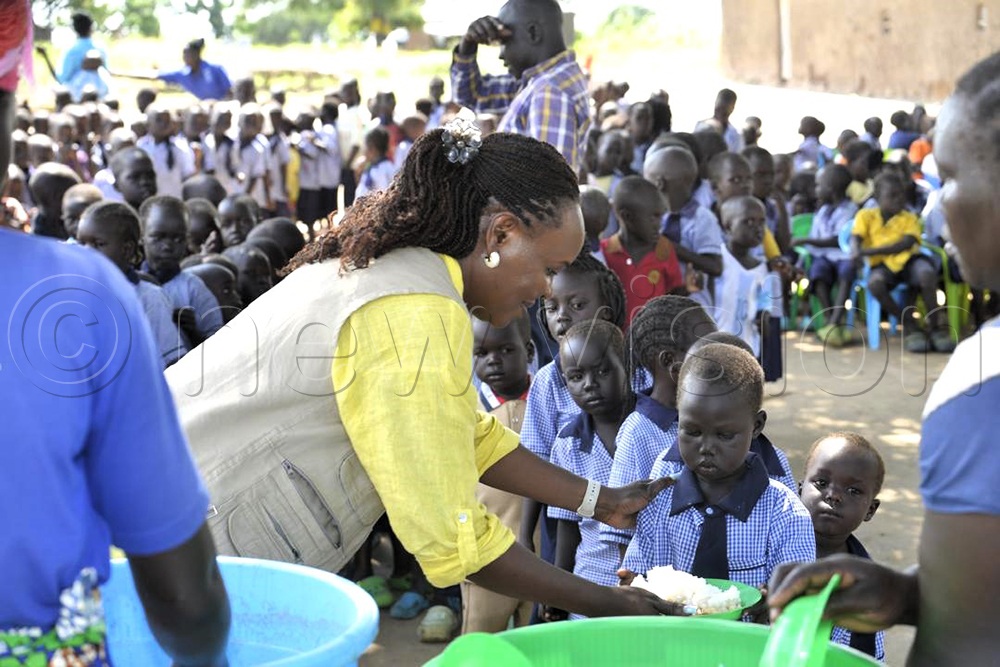4,000 refugee children enrolled on school feeding programme
Dinah Morgan, the country director of Stromme, pledged to support households whose children are benefitting from the feeding programme to plant fast-growing wood trees to regenerate the environment by providing a sustainable source of firewood and to establish kitchen gardens to improve household nutrition and food security.
Learners of Kiranga ECD in Bidibidi Refugee Settlement being served food during break time under the Stromme School feeding program. (Credit: Robert Ariaka)
WEST NILE - In a bid to address the severe food insecurity faced by refugees in Uganda's West Nile and Northern region, a school feeding programme to provide daily meals to over 4,000 children in Bidibidi, Palorinya and Palabek refugee settlements has been launched.
The programme aims to improve nutrition, create a safe learning environment and support the well-being of young refugees.
The refugee settlements in Uganda are facing a dire situation, with over 185,793 individuals registered in the West Nile region alone due to the influx of refugees from South Sudan, with children making up between 50 to 60% straining the available basic social services and facilities.
Centre Management Committee (CMC) chairperson of Kiranga Early Childhood Development (ECD), Robert Sebiti Zakariya, appealed to parents who cannot afford school fees to discuss other means for their children to study in the ECDs.
He suggests the supply of food by parents, which can be procured in line with the Home-grown school feeding model.
The school feeding programme is a lifeline for refugee children, providing them with the nutrition they need to focus on their education and build a brighter future.
Erina Zamba, a 6-year-old student at Kiranga ECD, said: "Before the feeding programme, I used to cry all the time due to hunger, but now I attend school every day because school is fun."
Richard Unzima, the lead caregiver in Sacred Heart ECD in Morobi zone 2, Palorinya refugee settlement, says, previously the school had no program of feeding but relied on the support from parents, and learners would only take porridge.
He says the introduction of school feeding by the Stromme Foundation has increased enrolment in the centre with 173 new learners who were at home but have returned to school.
Many children would stay home due to lack of food, but now parents are sending their children to school. It has improved children's participation in co-curricular activities, Unzima explained.
The refugee welfare committees disclose that several non-governmental organisations which used to support refugees closed their programs in 2024, leading to a cut in food assistance, lack of learning materials, insufficient teacher salaries and fewer opportunities for income generation.
As a result, a handful of children stopped attending education in early childhood development centres and primary schools because parents cannot pay development fees, which money is used to pay teachers.
Dinah Morgan, the country Director Stromme Foundation serving food to children in Sacred Heart ECD in Obongi district. (Credit: Robert Ariaka)
The parents find it difficult to contribute food items for feeding their children and paying cooks in schools.
The Office of the Prime Minister OPM estimates that the enrolment rate for Early Childhood Development (ECD) has dropped from 45% to 34% between late 2024 and early 2025, a significant decline for this critical stage of learning.
The school feeding program, funded through private donations by individuals in Norway and the Norwegian government, will provide daily hot meals to 4,000 children in 10 ECDs or pre-primary schools in Bidibidi, Palorinya and Palabek refugee settlements.
The programme will also benefit children from vulnerable host communities attending the 10 ECDs. The programme aims to ensure that young children have access to nutritious food, enabling them to focus on their education and build a brighter future.
Impact
The programme, now in its third week of operation since September 15, 2025, has also ensured parents express gratitude, citing the positive impact it has had on their children's health, behaviour, and learning.
"I have two children, but I was not able to provide them with food every day. Some days, we just drank tea the full day, and I could see them becoming small, and they were crying every time and were not playing. They were just sitting and lying down in the hut. But now when they start eating food at school, they now play a lot and they want to go to school every day," said Rose Modon, a parent of Kiranga ECD, in Bidibidi refugee settlement.
Dinah Morgan, the country director of Stromme, pledged to support households whose children are benefitting from the feeding programme to plant fast-growing wood trees to regenerate the environment by providing a sustainable source of firewood and to establish kitchen gardens to improve household nutrition and food security.
She expressed gratitude to the individual donors in Norway and the Norwegian government for providing the funds, which have been used to procure the food, install energy-efficient cooking systems, improve handwashing and other hygiene facilities, train cooks in food handling and train school feeding committees on their roles.
Hanifah Nyangoma, the assistant community services officer in charge of education at the Bidibidi refugee settlement, said the programme has addressed the food crisis caused by reduced funding to refugees and poor food yields due to unreliable weather and low soil productivity.
Obongi Resident District Commissioner Samuel Mpimbaza commended the initiative and encouraged parents to take their children to school.
|
He appeals to the teachers to return to class and ensure learning is not interrupted. Mpimbaza is pleased with the high enrolment impact as a result of the school feeding program, which makes children concentrate in class.
As the programme continues to make a positive impact, it is essential for the government, UNHCR and other development partners to strengthen support systems for enabling households of refugees to establish sustainable livelihoods to take charge of their welfare and their children’s education.
This will help them fight poverty, which fuels conflict and the refugee influx.